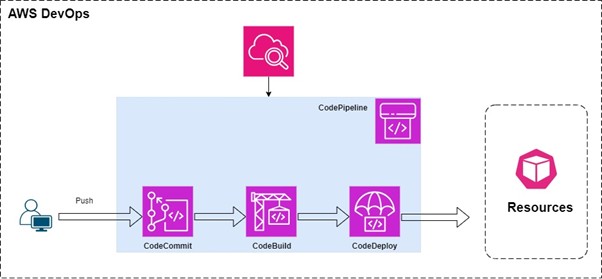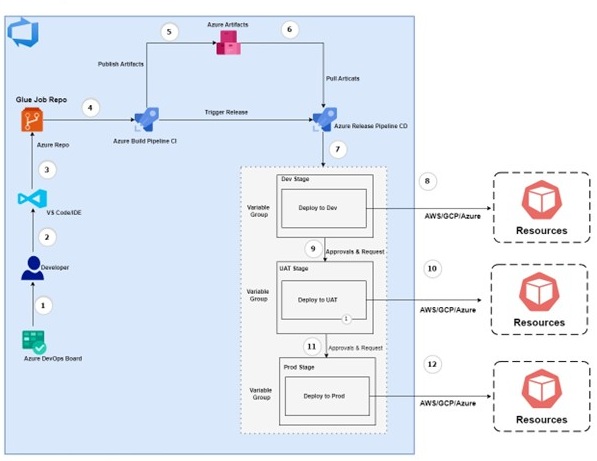
AWS DevOps vs Azure DevOps: Choosing the Right Platform for Your Needs
Introduction
Definition of DevOps
DevOps, a combination of "development" and "operations," is a set of practices and cultural philosophies that aim to automate and integrate software development (Dev) and IT operations (Ops) processes. The objective is to shorten system development life cycles, increase software release frequency, and enhance software quality through collaboration and communication between development and operations teams.
Importance of DevOps in Modern Software Development
DevOps plays a crucial role in modern software development for several reasons:
- Faster Time to Market: DevOps practices allow organizations to release software updates more frequently, enabling quick responses to market demands and customer feedback.
- Higher Quality Software: Automation and collaboration minimize the risk of human error and ensure consistent software quality.
- Efficiency and Cost Reduction: Streamlined processes and automation result in cost savings and effective resource utilization.
- Improved Collaboration:DevOps encourages better communication and collaboration between development and operations teams, fostering shared responsibility for software delivery.
AWS DevOps

Overview and History
Amazon Web Services (AWS) is a leading provider of cloud computing, offering a wide range of services to meet diverse IT requirements. AWS DevOps services are designed to support the DevOps journey in the AWS cloud environment.
Key Features:AWS DevOps services include:
- AWS CodeCommit: A secure and scalable source control service hosting Git repositories.
- AWS CodeBuild: A fully managed build service that compiles source code, executes tests, and generates software packages.
- AWS CodeDeploy: Automates code deployments to various computing services like EC2, Lambda, and on-premises servers.
- AWS CodePipeline: A continuous delivery service automating the build, test, and deployment phases of the release process.
Integration with Other AWS Services
AWS DevOps services seamlessly integrate with various other AWS services, making it a compelling choice for those who have already adopted AWS infrastructure.
- Pricing Model: AWS offers a flexible pricing model that allows you to pay only for the resources you use. For detailed pricing information, please refer to the AWS website.
- Use Cases and Success Stories: Numerous organizations, such as Netflix, Airbnb, and Airbnb, have successfully implemented AWS DevOps practices to enhance their software development processes. AWS's scalability and reliability make it an excellent choice for companies with a global presence.
Azure DevOps

Overview and History
Microsoft's Azure DevOps is a comprehensive suite of DevOps tools designed to support the entire DevOps lifecycle.
Key Features: Azure DevOps includes:
- Azure Boards: A work tracking system for planning, tracking, and discussing work across teams.
- Azure Repos: A version control system supporting both Git and Team Foundation Version Control (TFVC).
- Azure Pipelines: An automation platform for continuous integration and continuous delivery (CI/CD).
- Azure Test Plans: A testing framework for manual and exploratory testing.
- Azure Artifacts: A package manager supporting a wide range of artifacts.
Integration with Other AWS Services
Azure DevOps is deeply integrated with Microsoft's Azure cloud services, making it an excellent choice for organizations heavily invested in the Azure ecosystem.
- Pricing Model: Azure DevOps offers flexible pricing options, including a free tier for small teams and pay-as-you-go pricing for larger organizations. Detailed pricing information is available on the Microsoft Azure website.
- Use Cases and Success Stories: Companies like BMW, Accenture, and Johnson Controls have leveraged Azure DevOps to streamline their software development processes. Microsoft's strong enterprise presence makes Azure DevOps an appealing choice for large organizations.
Comparison of AWS DevOps and Azure DevOps
| Aspect | AWS DevOps | Azure DevOps |
|---|---|---|
| Cloud Ecosystem | Part of Amazon Web Services (AWS) | Part of Microsoft Azure |
| Integration with Cloud | Designed to integrate with AWS services | Designed to integrate with Azure services |
| CI/CD Services | AWS CodePipeline, AWS CodeBuild, AWS CodeDeploy | Azure Pipelines |
| Version Control | Supports Git, but no built-in system | Azure Repos (supports Git and TFVC) |
| Project Management | Primarily focused on CI/CD, lacks project management tools | Includes Azure Boards for project management |
| Collaboration | Limited collaboration tools | Offers collaboration and team management tools |
| Pricing | Pay for individual AWS services used | Pricing based on users, build minutes, and usage metrics |
| Extensibility | Highly extensible with third-party tools and services | Supports integrations with third-party tools |
Feature Comparison
Both AWS DevOps and Azure DevOps offer a comprehensive set of tools for DevOps, including source control, continuous integration, deployment automation, and project management. The choice may come down to the specific features that best align with your needs.
- Integration Capabilities: AWS DevOps services seamlessly integrate with various AWS services, while Azure DevOps is tightly integrated with the Azure ecosystem. Your choice might depend on your cloud provider preference.
- Pricing Comparison: Pricing models for both AWS and Azure DevOps are competitive, and the decision should be based on your team size and usage requirements.
- Ecosystem and Community Support: Both AWS and Azure have strong user communities and extensive documentation. Consider the availability of resources and expertise within your organization.
- Scalability and Performance: Both platforms are highly scalable and performant, but your choice might be influenced by your specific workload and performance requirements.
- Security and Compliance: AWS and Azure both provide a wide range of security and compliance features. Evaluate which platform best aligns with your organization's security needs and compliance standards.
Choosing the Right Platform: Factors to Consider
When choosing between AWS DevOps and Azure DevOps, consider the following factors:
- Existing Infrastructure: If you're already using one of the cloud providers, it may be more convenient to stick with that provider's DevOps solution.
- Team Expertise: Assess the skills and knowledge of your development and operations teams, as they may already be familiar with a particular platform.
- Project Requirements: Take into account the unique demands of your project, including specific features and integration with other services.
- Budget Constraints: Compare the pricing models of both platforms to ensure they align with your budget.
Pros and Cons
Pros of AWS DevOps
- Strong integration with AWS services.
- Extensive automation and CI/CD capabilities.
- Scalability and global reach.
- Success stories from leading companies.
Cons of AWS DevOps
- May not be suitable for organizations that do not utilize AWS.
- Learning curve for beginners.
Pros of Azure DevOps
- Tight integration with Microsoft's ecosystem.
- Comprehensive set of DevOps tools.
- Strong enterprise support and features.
- User-friendly interface.
Cons of Azure DevOps
- May not be the optimal choice for organizations that do not use Azure.
- Limited to Microsoft technologies.
When it comes to DevOps, selecting between AWS DevOps and Azure DevOps is a crucial decision that should align with your organization's specific requirements, infrastructure, and expertise. Both platforms offer robust DevOps solutions; however, they differ in terms of integration capabilities, ecosystems, and pricing models.
Share this

Abhay Kumar Singh
Senior Software Engineer, Software Projects
Abhay Kumar Singh serves as a Senior Software Engineer at Primus Software Corporation, where he has been contributing for over five years. An AWS Solutions Architect with 11+ years of experience, he specializes in designing scalable, secure, and efficient cloud solutions. Abhay holds AWS Certified Solutions Architect – Associate and Professional credentials and has strong expertise in Azure Cloud and Azure DevOps, enabling reliable and high-performance cloud deployments across diverse industries.
